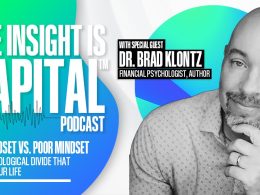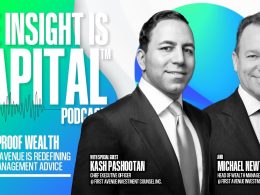6 Retirement Questions Financial Advisors Should Prepare For (And Every Client Should Ask)
by Commonwealth Financial Network
 When it comes to planning for the future, clients will have many questions for you, their trusted advisor. By responding carefully—and with relevant, detailed information—you'll help your clients make well-informed decisions and reach their retirement goals.
When it comes to planning for the future, clients will have many questions for you, their trusted advisor. By responding carefully—and with relevant, detailed information—you'll help your clients make well-informed decisions and reach their retirement goals.
But what will your clients want to know? Here are six critical retirement questions financial advisors should prepare for (and every client should ask).
Before you can answer questions about savings or investments, the first question for you and your clients to address is, "What will my retirement look like?" Keep in mind that many clients don't give much thought to the reality of this next stage of their lives, so the goal here is to help them develop a retirement vision.
A retirement vision is a detailed description of one's most fulfilling retired years. Help clients articulate—and realize—this vision by brainstorming their goals and dreams. Ask them to think about the qualitative, intangible benefits they get from work (e.g., camaraderie, creative stimulation, a sense of purpose). The following questions can help them get started:
- How will they replace these benefits in retirement?
- How do they plan to stay engaged and energized?
- Will they travel, take classes, or explore new hobbies or sports?
Although these questions don't involve finances directly, helping clients plan for their emotional retirement is just as important as helping them plan for their financial retirement.
Generally speaking, you can use this basic formula when answering the savings question: retirees will need anywhere from 70 percent to even 100 percent of their pre-retirement income to maintain the same standard of living once they stop working. Of course, a replacement percentage is no substitute for your detailed analysis of the client's current spending and retirement goals. Be sure to consider items like travel, hobbies, and—as we'll touch on next—health care.
Many clients underestimate how much they'll need to set aside for health care expenses. But just consider these statistics: According to a recent Fidelity Benefits Consulting estimate, a 65-year-old couple retiring in 2016 will need approximately $260,000 to cover medical expenses throughout retirement. Do your clients have a plan to meet these expenses?
Medicare. It's a common misconception that health care is free for those older than 65, but only Medicare Part A (hospital insurance) is free for most people. Part B (doctor services), Part C (Medicare Advantage coverage), Part D (prescription drugs), and Medicare supplement insurance (Medigap) come with a premium. Even if they have insurance coverage, clients should expect some out-of-pocket costs.
Other options. Health insurance for early retirees usually takes the form of COBRA or the spouse's employer-provided plan. Private insurance may be another option for the healthiest retirees. Alternatively, clients may qualify for HIPAA-eligible plans and high-risk pools, depending on the program their state offers. Uninsured retirees too wealthy to qualify for subsidized health plans will be able to buy coverage through private insurers via a state-sponsored insurance exchange.
Long-term care. According to Genworth's 2016 Annual Cost of Care Study, the monthly cost of a private nursing home room in 2016 was $7,698 and the cost of a semi-private room was $6,844. Be sure to emphasize to clients that Medicare will not cover most long-term care needs. Long-term care planning is a difficult topic—but talking about the benefits of long-term care insurance is among the most critical conversations you should have with your clients.
For some clients, the peace of mind of not having a mortgage may outweigh any financial considerations. But from a purely mathematical standpoint, clients shouldn't pay off a mortgage if the after-tax return on their investments is greater than the after-tax cost of maintaining the mortgage. Other factors that may favor retaining a mortgage include:
- How long clients plan to live in the home
- Their financial cushion
- How easily they could obtain a home equity loan in an emergency
Retirees can start taking social security between the ages of 62 and 70. If clients begin taking benefits before full retirement age (66 for most), the monthly benefit will be permanently reduced. If they delay taking benefits beyond age 66, however, benefits will increase about 8 percent per year.
Similarly, when evaluating pension payout options, your clients face an array of choices: annuity, joint and survivor, and pension maximization options. Ask about important factors, including the retiree's health, family history of longevity, cash flow, and marital status. When helping clients decide when to begin collecting social security benefits and pension payouts, don't rely solely on a breakeven calculation—this is only part of the story.
For those clients older than 70½, the simple answer here is to take required minimum distributions first and make up the difference from taxable accounts. For younger retirees, the most tax-efficient method is generally to take withdrawals from taxable accounts first. Which taxable accounts? Consider these simple rules of thumb:
- First, look for accounts with the potential to generate taxable losses. Investment losses can offset both long- and short-term capital gains, and then up to $3,000 in ordinary income.
- Next, look for assets with no opportunity for further tax deferral. These include maturing CDs, bonds, and other cash equivalents.
- Accounts with the smallest gains might come next. Under today's law, liquidating accounts with long-term capital gains is more tax-efficient than liquidating ones with short-term gains.
- Hold off as long as possible on investments with potential for tax deferral. Examples of this type of investment include variable annuities, traditional IRAs, and qualified retirement plans such as 401(k)s.
- Many experts advise leaving Roth IRAs alone as long as possible. Why? If you think tax rates will increase in the future, this approach is the most advantageous.
Granted, there are always exceptions to the general rules, and no withdrawal decision should be made on tax considerations alone. Clients wishing to maximize their estates, for example, may want to preserve assets that have tax advantages for beneficiaries, such as capital assets that receive a step-up in basis or Roth IRAs. The amount of withdrawals is also critical: Clients need to understand how much they can withdraw without outliving their savings.
I hope these six questions provide a launching point for retirement planning discussions. Be sure to ask pertinent follow-up questions to better understand your clients' specific planning needs and life circumstances—and invite them to ask you questions in return. By working together, you and your clients will be better positioned to make smart decisions on the path to building their dream retirement.
What other retirement questions do you address with your clients? Do you generally address long-term care insurance with your clients?
This material has been provided for general informational purposes only and does not constitute either tax or legal advice. Although we go to great lengths to make sure our information is accurate and useful, we recommend you consult a tax preparer, professional tax advisor, or lawyer.
Commonwealth Financial Network is the nation’s largest privately held independent broker/dealer-RIA. This post originally appeared on Commonwealth Independent Advisor, the firm’s corporate blog.
Copyright © Commonwealth Financial Network
















